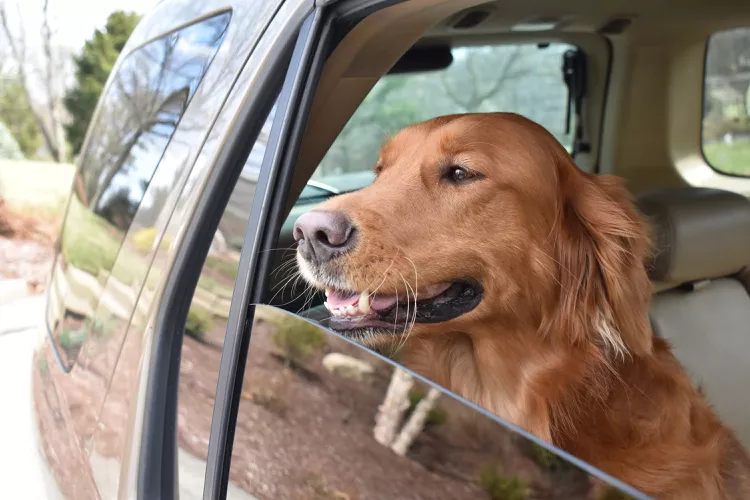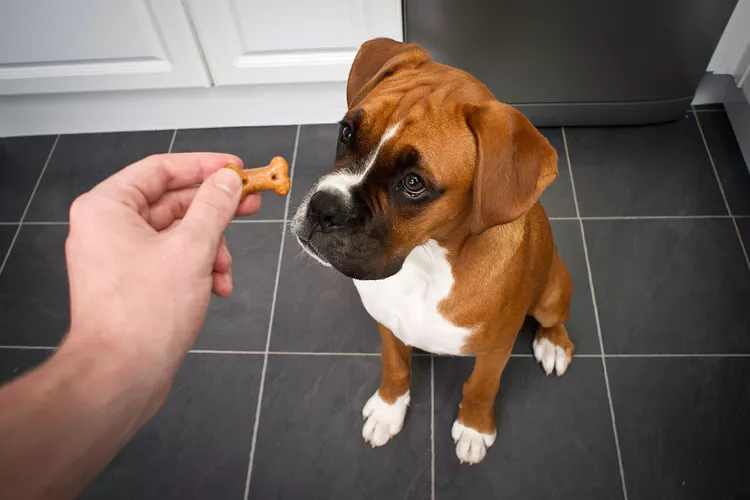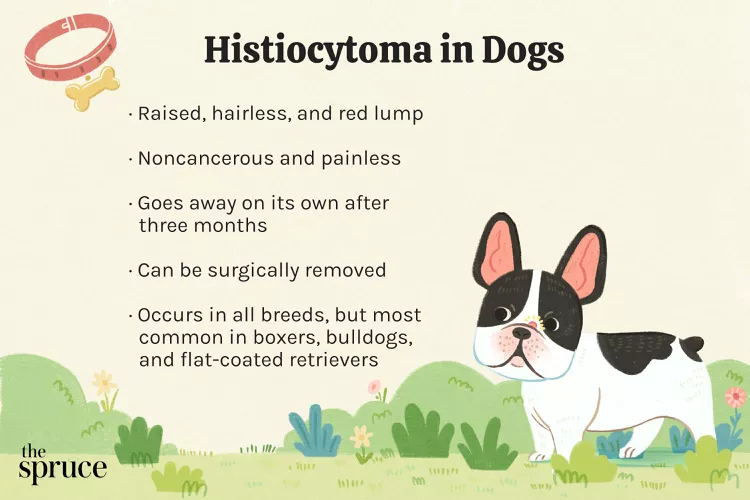
How does your dog feel about riding in your car? If it has no fear and loves a road trip, chances are it will jump right in. On the other hand, if it's afraid, it may struggle with you as you're trying to get it safely inside the car and whine or act up the whole way. Although this is a common dog phobia, it can be discouraging, distracting, and a potentially unsafe way to drive.
Fortunately, most people can help their dogs overcome this fear and become comfortable during car rides. The key is to gradually introduce your dog to the experience while associating the car with good experiences, including lots of positive reinforcement.
There are several reasons your dog may be scared of riding in your car. Your first move is determining which one is affecting your dog so you can figure out what to do next.
Just as people do, some dogs get car sick. They may feel nauseated or even vomit during car rides. If this sounds like your dog, that queasy, sick feeling may have conditioned your pet to become fearful of riding in cars.
Dogs that aren't used to going on car rides may be disturbed by the odd feeling of riding in a car. Cars usually have their own smell, and there's also the sound of the engine, the vibrations of the floor, and seeing everything whizzing past at a fast speed. Any or all of these things may make for a very frightening experience for your dog.
Some dogs associate the car with negative experiences, which can easily develop into a fear. For instance, the only time many dogs set their paws in a car is for a trip to the veterinarian. If your dog has negative feelings about going to the vet, those feelings may transfer to car rides.
If you adopt a shelter dog, the likelihood of them having had traumatic experiences that you don't know about increases. It's possible that the dog's only encounters with car rides were the trip to the shelter (or to a spot where it was abandoned) and the car ride to a new home. These frightening experiences could also account for a car phobia.
Similarly, a dog that's been involved in a car accident or hit by a car may have long-lasting fears about cars in general.
If your dog's fear of the car is related to car sickness, there's a fairly easy fix as dogs can take some over-the-counter medications to ease motion sickness. Talk to your veterinarian about the proper brand and dosage and whether this is a good option for your dog. It may also help to avoid car rides soon after your dog has had a meal.
If your dog's fear of car rides stems from more than motion sickness, chances are you'll have to put a bit more time and effort into getting rid of its phobia. By slowly introducing your dog to the car and creating a positive association with the experience, you can help your dog enjoy car rides.
Be patient and consistent with your dog and work in short sessions. Keep things positive and end each session before your dog has a chance to go into full-blown fear mode.
All dogs are different, and depending on the degree to which your dog is afraid, you can expect it to take a while for your canine buddy to conquer its fear. You may even need to go back a few steps if your dog unexpectedly reverts to fearful behaviors, which is okay, too.

Cute Pictures & Facts About Calico Cats & Kittens
Learn fascinating facts about calico cats, including photos, the genetics behind this color combination, and common folklore and traditions.
How to Prevent Cat Separation Anxiety During Vacations
Discover why cats develop litter box problems and cat behavior problems when you go on vacation and what you can do about it to help them.
Cat Behavior Changes That Might Mean Something's Wrong
Cats' behavioral changes may indicate problems—or they may mean nothing at all. Explore causes of odd behavior and what to do about them.
Lhasa Apso: Dog Breed Characteristics & Care
The Lhasa apso is an ancient breed from Tibet that was bred to be a watchdog. Learn about its history, health, exercise needs, and more.
Reasons Why Dogs Run Away and How to Stop It
Dogs can escape, especially if they’re bored and not properly contained. Here are some techniques for stopping your dog from running away.
Can Dogs Get Depression? How to Help Your Sad Dog
Can dogs get depression? Learn about the signs of depression in dogs and find out how to help your sad dog.
How to Stop Aggression in Dogs
Dog aggression can be a serious behavior issue for pet owners. Learn how to stop aggression in dogs before someone gets hurt.
How to Stop Your Dog From Growling
A growling dog can soon become even more aggressive. Reduce the noise and potential for a dangerous situation with some of these techniques.
Why Do Dogs Dig Holes? How to Stop Your Dog from Relandscaping Your Yard
Dogs have been digging holes for centuries and for many reasons. Whether they’re bored or want to cool off in the dirt, here are the top reasons why dogs dig holes.
Dog Treat Varieties
Learn about the different types of dog treats on the market and decide which are best for your dog.
Can Dogs Eat Asparagus?
Dogs can eat asparagus, provided the vegetable is cooked plain and cut up for them. Seasonings, salt, and butter make it unhealthy for dogs.
Histiocytomas in Dogs
A histiocytoma is a type of benign (non-cancerous) skin lump that usually affects young dogs. Learn the causes, treatment, and prevention.
Why Is My Dog’s Eye Swollen?
If your dog's eye is swollen, she may need veterinary attention. The inflammation could be caused by allergies, an injury, or even a tumor.
Common Bugs and Parasites Found on and Inside Dogs
Learn about common types of parasites in dogs. Find out how to treat and prevent parasites to keep your dog, your family, and yourself safe.
Exploring the Different Types of Pet-Friendly Beaches
Are you looking for pet-friendly beaches? Learn about the different types of pet-friendly beaches, their locations, and tips for visiting them with your pet.
10 Obscure, Little-known Canine Facts in Honor of National Dog Day
With National Dog Day upon us, it's time to celebrate everything about our favorite pets—even the weirder stuff. Here are 10 obscure facts about dogs you probably didn't know.
Kitten Development From 3 to 6 Months Old
Kittens grow and change a lot during their first year. Find out what happens between the ages of three months and six months old.
95 Siamese Cat Names
Our list of Siamese cat names has diverse and fun options to help you choose the ideal moniker for your elegant and lovable feline companion.
What to Buy for Your New Cat: A List of Essentials
Before you bring your new cat or kitten home, there are a number of things to collect or buy so your cat will feel welcomed like a family member.
The 6 Best Cat Nail Clippers of 2024 for a Safe Trim
Clipping your cat's nails can save your furniture and keep your kitty comfortable. We asked veterinarians for their cat nail clipper recommendations.